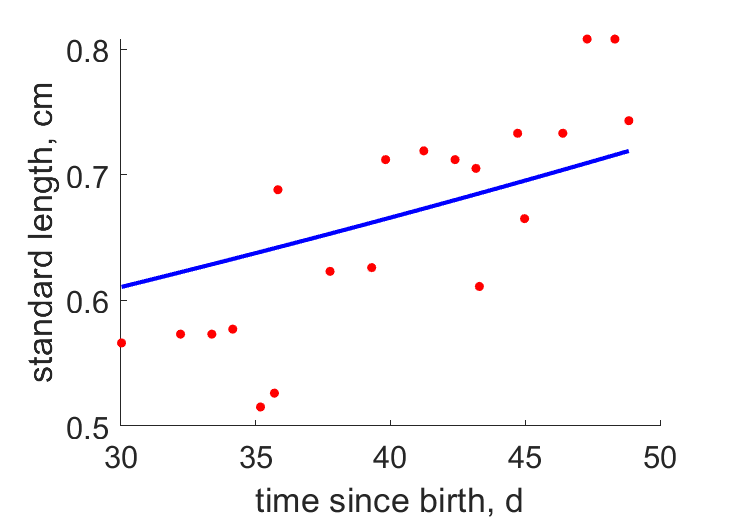Predictions & Data for this entry
| Model: abj | climate: MA, MB, MC | migrate: Mo | phylum: |
| COMPLETE = 2.5 | ecozone: MC | food: biPz | class: |
| MRE = 0.072 | habitat: 0jMpe, jiMpb | gender: D | order: |
| SMSE = 0.007 | embryo: Mpe | reprod: O | family: |
Zero-variate data
| Data | Observed | Predicted | (RE) | Unit | Description | Reference |
|---|---|---|---|---|---|---|
| am | 1095 | 1046 | (0.04435) | d | life span | guess |
| Lp | 1.7 | 1.573 | (0.07471) | cm | standard length at puberty | fishbase |
| Li | 6.3 | 6.17 | (0.0206) | cm | ultimate standard length | fishbase |
| Wwb | 0.00052 | 0.0005369 | (0.03244) | g | wet weight at birth | guess |
| Wwp | 0.02 | 0.02006 | (0.002931) | g | wet weight at puberty | fishbase |
| Wwi | 1.2 | 1.211 | (0.008899) | g | ultimate wet weight | fishbase |
| Ri | 0.2904 | 0.3048 | (0.04962) | #/d | max reprod rate | fishbase |
Uni- and bivariate data
| Data | Figure | Independent variable | Dependent variable | (RE) | Reference |
|---|---|---|---|---|---|
| tL |  | time since birth | standard length | (0.08247) | ConlGart2009 |
Pseudo-data at Tref = 20°C
| Data | Generalised animal | Notolychnus valdiviae | Unit | Description |
|---|---|---|---|---|
| v | 0.02 | 0.02366 | cm/d | energy conductance |
| p_M | 18 | 40.99 | J/d.cm^3 | vol-spec som maint |
| k_J | 0.002 | 0.002 | 1/d | maturity maint rate coefficient |
| k | 0.3 | 0.2554 | - | maintenance ratio |
| kap | 0.8 | 0.966 | - | allocation fraction to soma |
| kap_G | 0.8 | 0.7992 | - | growth efficiency |
| kap_R | 0.95 | 0.95 | - | reproduction efficiency |
Facts
- length-weight: Ww in g = 0.00389*(TL in cm)^3.12 (Ref: fishbase)
- Worldwide distribution in tropical, subtropical and temperate waters. Eastern Atlantic: west of British Isles and Bay of Biscay to South Africa. Western Atlantic: Canada to Argentina. Western Pacific: between 0 and 32S. Eastern Pacific: between 32N and 30S, but with 20S southern limit in Peruvian Transitional Zone. Eastern Indian Ocean: between 9-32S (Ref: fishbase)
Bibliography